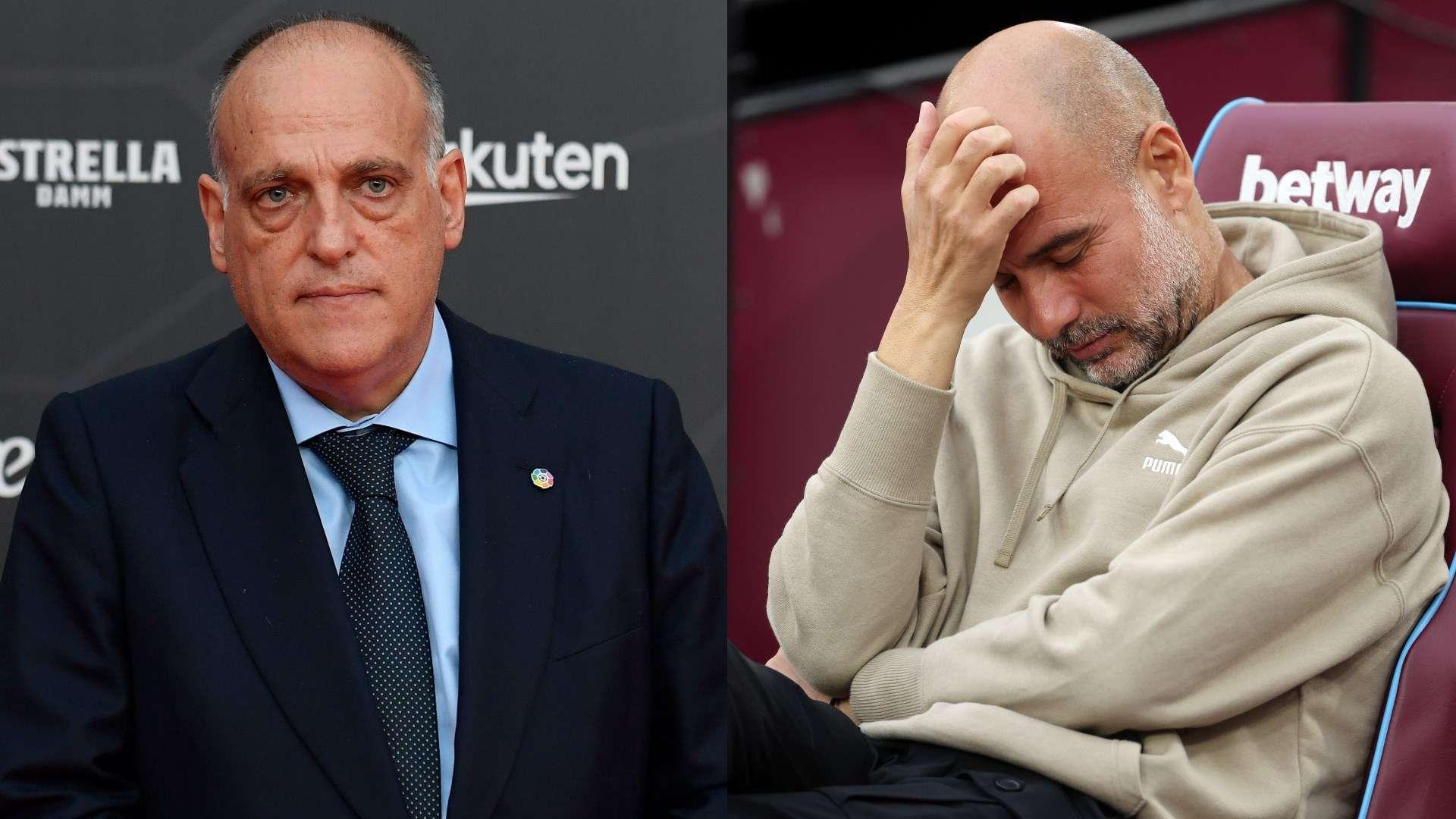La Liga President Calls for Sanctions on Manchester City
The ongoing legal battle surrounding Manchester City and their alleged breach of Financial Fair Play (FFP) rules has taken a new turn as La Liga president Javier Tebas has urged the Premier League to take action against the club if they are found guilty.
Background
Manchester City has been under intense scrutiny after allegations emerged about their manipulation of sponsorship deals to circumvent FFP regulations. The club has vehemently denied any wrongdoing but faces a legal battle that could potentially result in heavy sanctions.
Tebas’ Statement
Javier Tebas, known for his strong stance against financial doping in football, has called for the Premier League to impose sanctions on Manchester City if they are found guilty of breaching FFP regulations. Tebas believes that it is essential for the integrity of the sport that clubs adhere to financial regulations to maintain a level playing field.
Speaking to reporters, Tebas said, “If Manchester City are found guilty of violating FFP rules, it is crucial that the Premier League takes decisive action to uphold the integrity of football. Heavy sanctions must be imposed to send a clear message that financial fair play rules are not to be taken lightly.”
Legal Battle
The legal battle between Manchester City and UEFA began on Monday, with both parties presenting their cases to the Court of Arbitration for Sport. The outcome of this case could have far-reaching implications for Manchester City, with potential repercussions in both domestic and European competitions.
Manchester City has consistently denied any wrongdoing and has vowed to fight the allegations against them. The club maintains that they have always operated within the boundaries of FFP regulations and is confident in their legal defense.
Impact on Football
The outcome of this legal battle could have significant consequences for the world of football. If Manchester City is found guilty and faces heavy sanctions, it could set a precedent for how financial fair play rules are enforced across all leagues.
Clubs around the world will be closely watching the developments in this case, as it could shape the future of financial regulations in football. The integrity of the sport is at stake, and it is essential that governing bodies take decisive action to ensure fair play and transparency.
Conclusion
As the legal battle between Manchester City and UEFA continues to unfold, the football world waits with bated breath to see the outcome. Javier Tebas’ call for sanctions on Manchester City highlights the importance of upholding financial fair play rules to maintain the integrity of the sport.
Only time will tell how this case will ultimately be resolved and what impact it will have on the future of football. One thing is clear – the eyes of the footballing world are firmly fixed on this legal battle, anticipating the potential repercussions it may have on the beautiful game.
Manchester City’s Response
In response to the allegations and calls for sanctions, Manchester City has maintained their innocence and emphasized their commitment to complying with all financial regulations. The club has stressed that they have fully cooperated with the investigations and have provided all necessary documentation to support their case.
Manchester City’s legal team has been working tirelessly to defend the club against the accusations and is confident in their position. The club’s supporters have rallied behind them, showing unwavering support during this challenging time.
The Role of Financial Fair Play Regulations
Financial Fair Play regulations were introduced by UEFA to promote financial stability and fair competition in European football. The rules aim to prevent clubs from overspending and ensure that they operate within their means to avoid financial crises.
Compliance with FFP regulations is crucial to maintaining the financial integrity of football and preventing clubs from gaining an unfair advantage through excessive spending. The enforcement of these rules is essential to creating a level playing field where clubs compete based on merit rather than financial power.
The Global Impact of the Case
The Manchester City case has reverberated throughout the football world, prompting discussions about the effectiveness of financial regulations and the need for transparency in club finances. The outcome of this legal battle could have a ripple effect across all leagues, influencing how financial fair play rules are enforced globally.
Clubs, fans, and governing bodies are closely monitoring the developments in this case, as it could reshape the landscape of football governance and accountability. The case serves as a reminder of the importance of upholding financial regulations to protect the integrity and sustainability of the sport.
The Future of Financial Fair Play
Regardless of the outcome of the Manchester City case, the scrutiny surrounding their alleged breach of FFP rules has reignited debates about the effectiveness and enforcement of financial regulations in football. The incident has highlighted the need for greater transparency and oversight in club finances to prevent similar issues from arising in the future.
Governing bodies may need to reassess and strengthen their monitoring and enforcement mechanisms to ensure that clubs comply with financial regulations and uphold the principles of fair play. The Manchester City case could serve as a catalyst for reforms in how financial fair play rules are implemented and monitored moving forward.
Conclusion
As the legal battle between Manchester City and UEFA unfolds, the football world is faced with a critical moment that could shape the future of financial regulations in the sport. The case underscores the importance of upholding financial fair play rules to safeguard the integrity and fairness of football competitions.
Whether Manchester City is found guilty or not, the case serves as a wake-up call for clubs to adhere to financial regulations and for governing bodies to strengthen their oversight of club finances. The outcome of this case will have far-reaching implications for the world of football, emphasizing the need for transparency, accountability, and fair competition in the sport.
